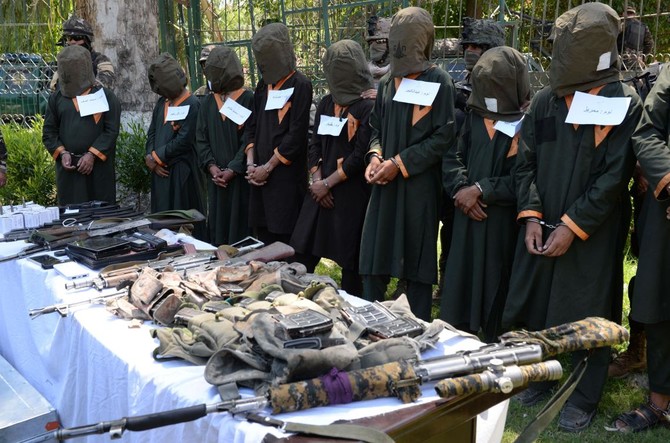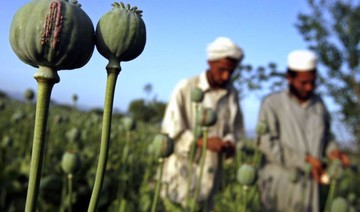KABUL: Afghan government and police officials have accused Iran of providing financial aid and advice to Taliban militants as part of its opposition to the US military presence in Afghanistan.
Mohinbullah Mohin, spokesman for the police of western Farah province, told Arab News on Sunday that Iran’s backing helped the Taliban to conduct a massive onslaught and capture most parts of Farah, which lies near the border with Iran, last week before being flushed out by a US-led Afghan counterattack.
“Iran has been seriously helping the Taliban by providing financial assistance for several years now. It was also involved in the latest incidents (Farah city falling to Taliban),” he told Arab News by phone from Farah.
“Its assistance is for the western region (expanded over several provinces) and the goal is to build its influence and strike a blow to the US (military presence in Afghanistan),” he said.
Earlier the police chief of Farah province, Fazl Ahmad Sherzad, had also claimed that Iran was involved in the May 15 Taliban attack on Farah city and that “they have been directly funding and providing arms to the Taliban as Iran sees Farah as part of its strategic interest.”
This claim was backed by the head of the provincial council of Farah, Farid Bakhtawar, on Wednesday, who claimed that the militant group crossed over from Iran, where it was trained and armed to conduct its attacks.
Some Taliban commanders live in Iran, where they also receive mentoring from Iranian advisers, said Mohib.
Officials at the defense ministry and presidential palace refused to comment about Iran’s role in the latest round of the Afghan war.
However, last week, the new US Secretary of State Mike Pompeo became apparently the first top American official to publicly accuse Iran.
“Iran’s support to the Taliban in the form of weapons and funding leads to further violence and hinders peace and stability for the Afghan people,” Pompeo was cited by media as saying in Washington.
Mohib rejected the speculations that Iran’s aid to the Taliban was in retaliation to President Donald Trump’s decision to withdraw from the Iran nuclear deal this month.
Aqa Noor Kentooz, former police chief for Farah province, told Arab News that authorities had found anti-personnel mines with the Taliban with Iran’s marking when he served in Farah a few years ago.
Mohib added that Iran’s discourse with Afghanistan in the west was “over water:” Iran felt that the construction of a water dam by Afghanistan would deprive it of its share of water.
It was not immediately possible to seek a reaction from Iran’s embassy in Kabul.
However, the Taliban spokesman denied that the group had received any assistance from Iran, calling the accusation part of a move by Kabul and Washington to conceal their military setbacks.
Iran funding Taliban to affect US military presence in Afghanistan, say police and lawmakers
Iran funding Taliban to affect US military presence in Afghanistan, say police and lawmakers

- Police officials and lawmakers accuse Iran of funding and arming Taliban in the country's western parts to increase its strategic influence
- Farah police, however, dismiss the notion that Iranian interference was in retaliation to the US' withdrawal from the Iran nuclear deal this month












